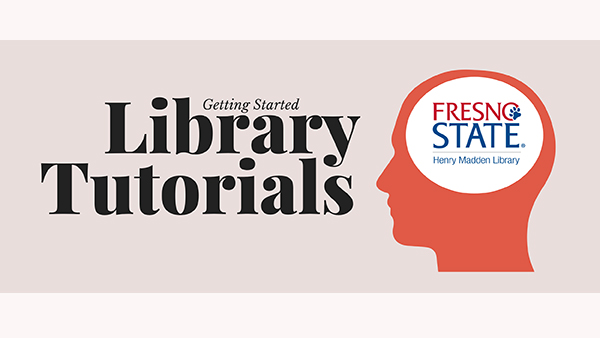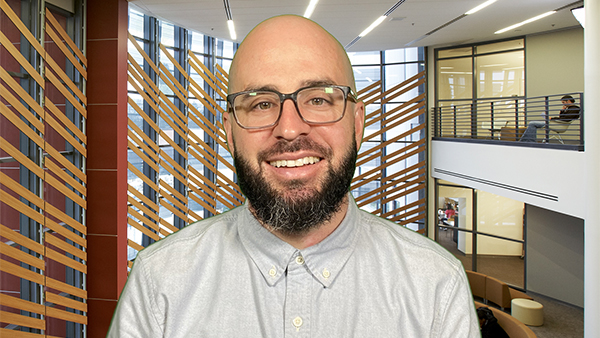|
The Madden Library digital badging program delivers information literacy skills in a flexible format for both learning and instruction.
A year ago, the Henry Madden Library Research Services division launched its digital badging program for Library Tutorials under the direction of librarian Matt Doyle. As part of an initiative to give students a flexible way to learn how to find, use, and evaluate resources for their research, the program has proven to be an under-the-radar success — especially in a time of virtual instruction.
Students can self-enroll for the Information Literacy Canvas course and earn badges to verify their increasing levels of competence. Faculty can also assign the course modules as asynchronous assignments in their classes. With over 5,000 badges earned in the 2019-20 academic year, the program is proving to be a win-win.
The Information Literacy Tutorials have modules on topics such as:
- Finding Books and Articles
- Preventing Plagiarism
- Finding Surveys and Instruments
- Evaluating Sources and more
Read on to find out more about Matt Doyle, who is also the library’s liaison to the Kremen School of Education and Human Development, and about the benefits of the Library Tutorials digital badging program at the Henry Madden Library.
Matt, how long have you been with the Henry Madden Library and in what capacity?
I have been a public services librarian in the Madden library since June of 2016. I primarily work as a liaison to the Kremen School of Education and Human Development, a role that has kept me very busy over the past few years. In addition to that, I coordinate our library digital badging program, work with our library web development team and some "other duties as assigned."
Tell us about your areas of interest, research and expertise as a librarian.
I really enjoy diving into new areas of research on a daily basis with the students in KSOEHD. As part of my role as liaison, I get to help guide students through the literature search process. Most of the students that come to me for help are working on projects, thesis or dissertations. Our students always have really interesting topics and issues they want to explore and I am grateful they include me in their searches. We work together to develop search strategies, overcome any obstacles, and develop the skills necessary to effectively find and use high quality research in their own papers. Professionally, I have found no greater joy than zwatching it all click for a student as they pick up skills and knowledge necessary to synthesize prior research into their own work. This work also ties in really well with my own research interests, student agency and information literacy.
What are some of your goals or accomplishments at the Madden Library or in your individual work as a librarian?
I would say the accomplishments I am most proud of are the relationships I have developed with students and faculty across campus these past few years. I have had the privilege of working with the Center for Faculty Excellence, the Google Migration Team, Technology Services, the Learning Center and CAIFE on campus projects and activities that really made an impact. Each of those opportunities allowed me to collaborate with more people on campus than I would have ever been able to from the confines of the library. Aside from that, in terms of goals — I am always looking for ways to be more effective at reaching the students in the programs I work with. This semester, I am going to continue experimenting with new technology to meet those needs.
Let us know a bit more about yourself outside of the library.
I grew up in New Jersey and attended Rutgers University for both my undergraduate and graduate degrees. I have way too many hobbies to list, but right now I am planning on building some cabinets for my garage. I used to surf — but then I moved to Fresno.
Can you give us an overview of the Henry Madden Library Digital Badging program and its objectives?
We are currently issuing digital badges to students as evidence of completing library modules in our Library Tutorials course. The course is aimed at developing the information literacy skills necessary for success in academic work. Each module in the course covers a single information literacy objective. At the completion of the module, students take an assessment designed to measure their understanding of the content covered. The library grades these assessments and if students demonstrate a mastery of the content covered, they are issued a badge.
We began to issue digital badges in the library to overcome a simple problem, the library does not show up on a transcript. Micro-credentialing, an umbrella term that digital badging falls under, gives students the opportunity to demonstrate achievement in areas that are otherwise not typically documented. The idea for this came from students telling us they had completed the same library orientations or workshops multiple times in the same semester. A badge allows for students to provide instructors with actual evidence of learning; students share their badge as proof of what they completed and when they completed it. Instead of completing the same lesson multiple times in a semester, students can now explore new lessons to deepen their understanding instead of repeating the same activities for multiple courses.
How did last year’s badging program go? What worked and what’s getting enhancements?
The 2019-20 academic year was our first full year offering this type of online learning. Over 2,300 students participated and the library issued just over 5,300 badges. The feedback we received from faculty and students was overall very positive. This year, we are adding a few new lessons based on feedback to expand on our initial offering, and refining the lessons we had in place. As we continue to add lessons, we will start to incorporate more pathways into the program. These pathways allow students to stack badges for higher level achievements.
What benefits are faculty and students receiving by participating in the badging program? And how can it be of help as a virtual instruction option?
I think the real benefit of the Library Tutorials course is that it can be self directed or assigned by instructors. The course is open to all faculty and students as a self-enroll course. Students that just want to become better equipped to complete academic research can learn at any time, and they will have evidence of any work they put in. On the faculty end, they can pick and choose the tutorials that will best equip students with the library-related skills they need to succeed in their courses. Another added benefit is that these do not interfere with scheduled instructional time. Since all of the content is born-digital, it integrates well into any course transitioning to virtual.
Where can faculty or students go to find out more about the digital badging program?
Anyone can learn more about digital badges by self-enrolling in the course. There is a page in the course specifically for faculty looking to learn more about how to integrate the lessons into their courses. If you have any questions, I am happy to answer them, mdoyle@csufresno.edu.
|



